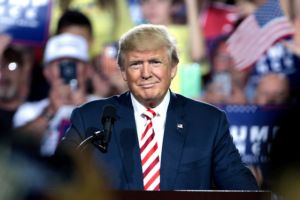Opinion
Danish Capital in 2020: Trump’s America visibly cracking as coronavirus cases accelerate
Neil Smith
This article is more than 5 years old.

The time for smirking at the predicament is over (photo: Gage Skidmore)
As the novel coronavirus sweeps through the developed world, it seems clear that most societal debate will occur in the United States. This may seem counter-intuitive – after all hospitals in Lombardy are overrun, with over 5,000 fatalities. There are, however, tentative signs that the number of new cases in Italy is peaking; the figures in the US, by contrast, are only accelerating.
It will be jarring for ordinary Americans to see the lack of ventilators and protective equipment in the wealthiest country in the world. By their nature crises tend to hold a mirror up to societies, exposing their strengths and weaknesses. In America’s case, there are clear structural reasons to believe the virus will pose a unique challenge.
The existential consequences come from the fact that not all Americans are aware of the country’s limitations. There is a tendency for Americans, particularly affluent ones, brought up on the mantra of American exceptionalism, to believe that they live in the best country in the world. This is not merely narrow nationalism: wealthy Americans enjoy unparalleled educational opportunities, where the likes of Harvard, Stanford and MIT are world-beaters; they receive state of the art healthcare; and they enjoy exceptional job opportunities and endless cultural options, ranging from live theatre to television, as well as exquisite cuisines from around the globe. If you are fortunate enough to be born into a family of means, America really is the best country in the world.
What is less obvious to well-heeled Americans is the flip-side of the coin. Informal societal and educational segregation means few affluent Americans have experiences life on the other side of the tracks, which is significantly worse than in other developed countries. The socioeconomic figures are clear and range from the shocking level of homelessness and the hundreds of thousands of bankruptcies each year due to healthcare costs, to declining life expectancy rates and both income and opportunity inequality. Tens of millions of workers are in casual jobs with almost no rights, and many have to juggle multiple jobs simply to make ends meet. A 2019 Fed survey found that 40 percent of adults would struggle to meet an unexpected expense of 400 dollars. The ongoing impact of the Coronavirus will shine a light on these issues.
Issues with government
The challenges unique to America start at the very top. A number of heads of state have struggled to balance the competing rights of liberty and the economy on one side, and the need to protect public health on the other. This is not surprising: these trade-offs are difficult on a number of levels, and this situation is unprecedented in modern times. No leader, though, has been as erratic as President Donald Trump, who started by saying the virus would be no more than a mere inconvenience, before pivoting to recommend social distancing. Now the president seems to have changed tack again, saying he wants the churches full for Easter (scientists say there could be few worse things for spreading the virus) and the economy roaring back to life. At all times he has refused to accept any blame for some of the gaping holes in the federal government response, claiming that this crisis was totally unpredictable (in fact, it was both predictable and predicted).
With a president veering all over the place in terms of both tone and content, it is no surprise that many Americans are confused. President Trump has been fortunate until now that world events have been benign – the economic conditions have been favourable and the foreign policy mini-crises (like Iran and North Korea) have been entirely self-inflicted. Observers who wondered how the president would cope with a genuine crisis now have their answer. As the epidemic develops, a fresh bout of introspection is likely as to why Americans chose a braggadocios real estate promoter turned reality star, with no previous political or military experience.
It would be wrong, though, to say that the president bares all the blame for the inept response of the American institutions. The country initially fell behind in testing because of faulty kit. The Center for Disease Control decided that the US should use its own test, rather than the one widely available internationally – and promptly botched the job! The sprawling pitchwork quilt of federal, state and county institutions (many of which are underfunded) has led to confusion over roles and different rules in different areas. The diffusion of responsibility proved a severe weakness where a nationwide epidemic was brewing, and clear and consistent guidelines were required.
Societal issues
The possibility for soul-searching extends from the role of government to the structure of American society. Any healthcare crisis will inevitably highlight how the US is the only major industrial nation without a nationwide public health system. It is unclear what will happen to the 30 million uninsured people in America when a hefty number of them fall critically ill (as they surely will). The tens of millions more who are under-insured will also be feeling uncomfortable –all the while as jobs (often accompanied by health coverage) are hit.
This represents a fundamental issue of fairness: who deserves treatment during an epidemic? It also highlights the practical limitations of the US healthcare system: even if tests were widely available, many people would not have taken them at the start, for the simple reason of cost. Even the insured would typically have to pay several hundred dollars in deductibles. This naturally means a decreased visibility of the background numbers, and by the time the government stepped in to cover costs, the horse had left the stable.
Healthcare is not the only set-up that may have exacerbated the problem. Tens of millions of Americans do not receive sick pay, either because they are employed at will, or work in the gig economy. It was always fanciful to expect these people, reliant on regular income, to make ends meet or to self-isolate early on. This may have led to the quick spread of the disease and will likely remain an issue if the economy is opened up too early. An eventual discussion about the fairness of the system can be expected.
Another aspect of American life shocking to foreigners is the sheer amount of homelessness, which numbers over half a million people. The homeless community, many of whom have underlying conditions and where there is severe practical limitations on hygiene, are clearly a highly vulnerable group. Cities with particular problems, like Los Angeles and San Francisco, are making admirable efforts to mitigate the effects of the virus, but it is likely not enough. That these people may be hit so hard is both a personal tragedy and something that will impact the general fight against the virus, as they can inadvertently facilitate the spread.
Finally, it is not solely the homeless that are more at risk from the coronavirus. Those with underlying conditions including heart disease, diabetes and obesity, are particularly vulnerable. In these areas, America has the highest numbers in the world – almost 40 percent of adults are obese, and over 10 percent have diabetes. These figures are not evenly spread, with lower income Americans disproportionately unhealthy. These factors, combined with unequal access to healthcare more generally, raise the real possibility of this virus hitting lower-income workers particularly hard.
Taking all of these factors together, it is likely that this virus will disproportionately impact lower-income earners, leading to debate about the structure of American government and society more generally. There will be many media outlets pushing a different narrative. Parlaying President Trump’s argument that this was entirely unpredicted, they will argue this was a “one-off, once in a century” event, and use strategic comparisons with a harder hit country (there is always someone worse off!). Whether this misdirection works, will depend upon how eloquent and convincing public policy advocates can be, and ultimately the choice of the American people.
The US therefore faces tough times ahead, but none of this is to say there is not heroic work being performed. The local communities, from churches to sports clubs and charities remain strong; the spirit and ingenuity of its people is unparalleled; and medical staff are performing with professionalism, dedication and empathy. All of this will be required in the weeks and months to come to deal with the juggernaut heading down the tracks of a societal structure poorly equipped to deal with it. The US truly is an exceptional country, but in troubling as well as positive ways.

About
Neil Smith
Neil is a Scottish-educated lawyer with many years of experience in corporate structuring and general commercial matters. Based in Copenhagen, he primarily advises on international deals. Out of the office his interests include sport and politics. His column explores topical international financial and economic issues from a Danish perspective.










































